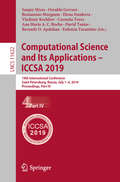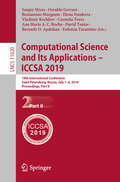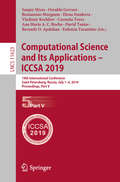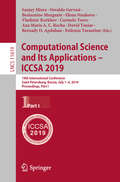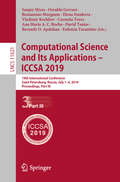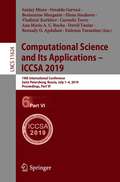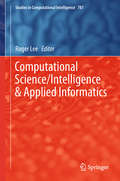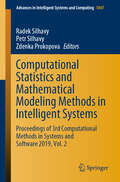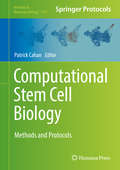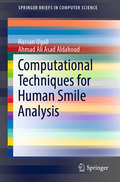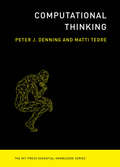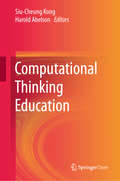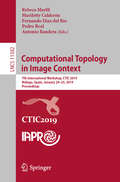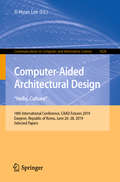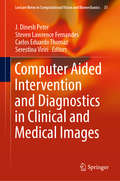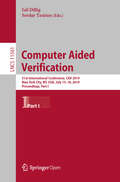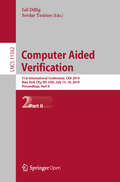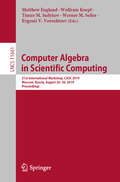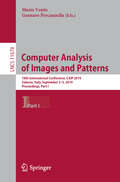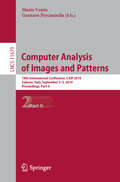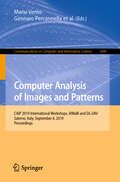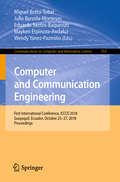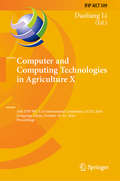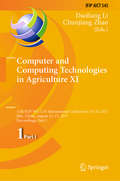- Table View
- List View
Computational Science and Its Applications – ICCSA 2019: 19th International Conference, Saint Petersburg, Russia, July 1–4, 2019, Proceedings, Part IV (Lecture Notes in Computer Science #11622)
by Sanjay Misra Osvaldo Gervasi Beniamino Murgante Elena Stankova Vladimir Korkhov Carmelo Torre Ana Maria A. C. Rocha David Taniar Bernady O. Apduhan Eufemia TarantinoThe six volumes LNCS 11619-11624 constitute the refereed proceedings of the 19th International Conference on Computational Science and Its Applications, ICCSA 2019, held in Saint Petersburg, Russia, in July 2019.The 64 full papers, 10 short papers and 259 workshop papers presented were carefully reviewed and selected form numerous submissions. The 64 full papers are organized in the following five general tracks: computational methods, algorithms and scientific applications; high performance computing and networks; geometric modeling, graphics and visualization; advanced and emerging applications; and information systems and technologies. The 259 workshop papers were presented at 33 workshops in various areas of computational sciences, ranging from computational science technologies to specific areas of computational sciences, such as software engineering, security, artificial intelligence and blockchain technologies.
Computational Science and Its Applications – ICCSA 2019: 19th International Conference, Saint Petersburg, Russia, July 1–4, 2019, Proceedings, Part II (Lecture Notes in Computer Science #11620)
by Sanjay Misra Osvaldo Gervasi Beniamino Murgante Elena Stankova Vladimir Korkhov Carmelo Torre Ana Maria A. C. Rocha David Taniar Bernady O. Apduhan Eufemia TarantinoThe six volumes LNCS 11619-11624 constitute the refereed proceedings of the 19th International Conference on Computational Science and Its Applications, ICCSA 2019, held in Saint Petersburg, Russia, in July 2019.The 64 full papers, 10 short papers and 259 workshop papers presented were carefully reviewed and selected form numerous submissions. The 64 full papers are organized in the following five general tracks: computational methods, algorithms and scientific applications; high performance computing and networks; geometric modeling, graphics and visualization; advanced and emerging applications; and information systems and technologies. The 259 workshop papers were presented at 33 workshops in various areas of computational sciences, ranging from computational science technologies to specific areas of computational sciences, such as software engineering, security, artificial intelligence and blockchain technologies.
Computational Science and Its Applications – ICCSA 2019: 19th International Conference, Saint Petersburg, Russia, July 1–4, 2019, Proceedings, Part V (Lecture Notes in Computer Science #11623)
by Sanjay Misra Osvaldo Gervasi Beniamino Murgante Elena Stankova Vladimir Korkhov Carmelo Torre Ana Maria A. C. Rocha David Taniar Bernady O. Apduhan Eufemia TarantinoThe six volumes LNCS 11619-11624 constitute the refereed proceedings of the 19th International Conference on Computational Science and Its Applications, ICCSA 2019, held in Saint Petersburg, Russia, in July 2019.The 64 full papers, 10 short papers and 259 workshop papers presented were carefully reviewed and selected form numerous submissions. The 64 full papers are organized in the following five general tracks: computational methods, algorithms and scientific applications; high performance computing and networks; geometric modeling, graphics and visualization; advanced and emerging applications; and information systems and technologies. The 259 workshop papers were presented at 33 workshops in various areas of computational sciences, ranging from computational science technologies to specific areas of computational sciences, such as software engineering, security, artificial intelligence and blockchain technologies.
Computational Science and Its Applications – ICCSA 2019: 19th International Conference, Saint Petersburg, Russia, July 1–4, 2019, Proceedings, Part I (Lecture Notes in Computer Science #11619)
by Sanjay Misra Osvaldo Gervasi Beniamino Murgante Elena Stankova Vladimir Korkhov Carmelo Torre Ana Maria A. C. Rocha David Taniar Bernady O. Apduhan Eufemia TarantinoThe six volumes LNCS 11619-11624 constitute the refereed proceedings of the 19th International Conference on Computational Science and Its Applications, ICCSA 2019, held in Saint Petersburg, Russia, in July 2019.The 64 full papers, 10 short papers and 259 workshop papers presented were carefully reviewed and selected form numerous submissions. The 64 full papers are organized in the following five general tracks: computational methods, algorithms and scientific applications; high performance computing and networks; geometric modeling, graphics and visualization; advanced and emerging applications; and information systems and technologies. The 259 workshop papers were presented at 33 workshops in various areas of computational sciences, ranging from computational science technologies to specific areas of computational sciences, such as software engineering, security, artificial intelligence and blockchain technologies.
Computational Science and Its Applications – ICCSA 2019: 19th International Conference, Saint Petersburg, Russia, July 1–4, 2019, Proceedings, Part III (Lecture Notes in Computer Science #11621)
by Osvaldo Gervasi Beniamino Murgante Sanjay Misra Ana Maria A. C. Rocha David Taniar Bernady O. Apduhan Elena Stankova Eufemia Tarantino Vladimir Korkhov Carmelo TorreThe six volumes LNCS 11619-11624 constitute the refereed proceedings of the 19th International Conference on Computational Science and Its Applications, ICCSA 2019, held in Saint Petersburg, Russia, in July 2019.The 64 full papers, 10 short papers and 259 workshop papers presented were carefully reviewed and selected form numerous submissions. The 64 full papers are organized in the following five general tracks: computational methods, algorithms and scientific applications; high performance computing and networks; geometric modeling, graphics and visualization; advanced and emerging applications; and information systems and technologies. The 259 workshop papers were presented at 33 workshops in various areas of computational sciences, ranging from computational science technologies to specific areas of computational sciences, such as software engineering, security, artificial intelligence and blockchain technologies.
Computational Science and Its Applications – ICCSA 2019: 19th International Conference, Saint Petersburg, Russia, July 1–4, 2019, Proceedings, Part VI (Lecture Notes in Computer Science #11624)
by Osvaldo Gervasi Beniamino Murgante Sanjay Misra Ana Maria A. C. Rocha David Taniar Bernady O. Apduhan Elena Stankova Eufemia Tarantino Vladimir Korkhov Carmelo TorreThe six volumes LNCS 11619-11624 constitute the refereed proceedings of the 19th International Conference on Computational Science and Its Applications, ICCSA 2019, held in Saint Petersburg, Russia, in July 2019.The 64 full papers, 10 short papers and 259 workshop papers presented were carefully reviewed and selected form numerous submissions. The 64 full papers are organized in the following five general tracks: computational methods, algorithms and scientific applications; high performance computing and networks; geometric modeling, graphics and visualization; advanced and emerging applications; and information systems and technologies. The 259 workshop papers were presented at 33 workshops in various areas of computational sciences, ranging from computational science technologies to specific areas of computational sciences, such as software engineering, security, artificial intelligence and blockchain technologies.
Computational Science/Intelligence & Applied Informatics (Studies in Computational Intelligence #726)
by Roger LeeThis book presents the outcomes of the 5th ACIS International Conference on Computational Science/Intelligence & Applied Informatics (CSII 2018), which was held on July 10–12, 2018 in Yonago, Japan. The aim of the conference was to bring together researchers and scientists, businesspeople and entrepreneurs, teachers, engineers, computer users, and students to discuss the various fields of computer science, to share their experiences, and to exchange new ideas and information in a meaningful way. All aspects (theory, applications and tools) of computer and information science, the practical challenges encountered along the way, and the solutions adopted to solve them are all explored here. The conference organizers selected the best papers from among those accepted for presentation. The papers were chosen on the basis of review scores submitted by members of the program committee and subsequently underwent further rigorous review. Following this second round of review, 13 of the conference’s most promising papers were selected for this Springer (SCI) book. We eagerly await the important contributions that we know these authors will make to the field of computer and information science.
Computational Statistics and Mathematical Modeling Methods in Intelligent Systems: Proceedings of 3rd Computational Methods in Systems and Software 2019, Vol. 2 (Advances in Intelligent Systems and Computing #1047)
by Radek Silhavy Petr Silhavy Zdenka ProkopovaThis book presents real-world problems and exploratory research in computational statistics, mathematical modeling, artificial intelligence and software engineering in the context of the intelligent systems. This book constitutes the refereed proceedings of the 3rd Computational Methods in Systems and Software 2019 (CoMeSySo 2019), a groundbreaking online conference that provides an international forum for discussing the latest high-quality research results.
Computational Stem Cell Biology: Methods and Protocols (Methods in Molecular Biology #1975)
by Patrick CahanThis volume details methods and protocols to further the study of stem cells within the computational stem cell biology (CSCB) field. Chapters are divided into four sections covering the theory and practice of modeling of stem cell behavior, analyzing single cell genome-scale measurements, reconstructing gene regulatory networks, and metabolomics. Written in the highly successful Methods in Molecular Biology series format, chapters include introductions to their respective topics, lists of the necessary materials and reagents, step-by-step, readily reproducible laboratory protocols, and tips on troubleshooting and avoiding known pitfalls.Authoritative and cutting-edge, Computational Stem Cell Biology: Methods and Protocols will be an invaluable guide to researchers as they explore stem cells from the perspective of computational biology.
Computational Techniques for Human Smile Analysis (SpringerBriefs in Computer Science)
by Hassan Ugail Ahmad Ali AldahoudIn this book, the authors discuss the recent developments in computational techniques for automated non-invasive facial emotion detection and analysis with particular focus on the smile. By way of applications, they discuss how genuine and non-genuine smiles can be inferred, how gender is encoded in a smile and how it is possible to use the dynamics of a smile itself as a biometric feature. It is often said that the face is a window to the soul. Bearing a metaphor of this nature in mind, one might find it intriguing to understand, if any, how the physical, behavioural as well as emotional characteristics of a person could be decoded from the face itself. With the increasing deductive power of machine learning techniques, it is becoming plausible to address such questions through the development of appropriate computational frameworks. Though there are as many as over twenty five categories of emotions one could express, regardless of the ethnicity, gender or social class, across humanity, there exist six common emotions – namely happiness, sadness, surprise, fear, anger and disgust - all of which can be inferred from facial expressions. Of these facial expressions, the smile is the most prominent in social interactions. The smile bears important ramifications with beliefs such as it makes one more attractive, less stressful in upsetting situations and employers tending to promote people who smile often. Even pockets of scientific research appear to be forthcoming to validate such beliefs and claims, e.g. the smile intensity observed in photographs positively correlates with longevity, the ability to win a fight and whether a couple would stay married. Thus, it appears that many important personality traits are encoded in the smile itself. Therefore, the deployment of computer based algorithms for studying the human smiles in greater detail is a plausible avenue for which the authors have dedicated the discussions in this book.
Computational Thinking (The MIT Press Essential Knowledge Series)
by Peter J. Denning Matti TedreAn introduction to computational thinking that traces a genealogy beginning centuries before the digital computer. A few decades into the digital era, scientists discovered that thinking in terms of computation made possible an entirely new way of organizing scientific investigation; eventually, every field had a computational branch: computational physics, computational biology, computational sociology. More recently, “computational thinking” has become part of the K–12 curriculum. But what is computational thinking? This volume in the MIT Press Essential Knowledge series offers an accessible overview, tracing a genealogy that begins centuries before digital computers and portraying computational thinking as pioneers of computing have described it. The authors explain that computational thinking (CT) is not a set of concepts for programming; it is a way of thinking that is honed through practice: the mental skills for designing computations to do jobs for us, and for explaining and interpreting the world as a complex of information processes. Mathematically trained experts (known as “computers”) who performed complex calculations as teams engaged in CT long before electronic computers. The authors identify six dimensions of today's highly developed CT—methods, machines, computing education, software engineering, computational science, and design—and cover each in a chapter. Along the way, they debunk inflated claims for CT and computation while making clear the power of CT in all its complexity and multiplicity.
Computational Thinking Education
by Siu-Cheung Kong Harold AbelsonThis This book is open access under a CC BY 4.0 license.This book offers a comprehensive guide, covering every important aspect of computational thinking education. It provides an in-depth discussion of computational thinking, including the notion of perceiving computational thinking practices as ways of mapping models from the abstraction of data and process structures to natural phenomena. Further, it explores how computational thinking education is implemented in different regions, and how computational thinking is being integrated into subject learning in K-12 education. In closing, it discusses computational thinking from the perspective of STEM education, the use of video games to teach computational thinking, and how computational thinking is helping to transform the quality of the workforce in the textile and apparel industry.
Computational Topology in Image Context: 7th International Workshop, CTIC 2019, Málaga, Spain, January 24-25, 2019, Proceedings (Lecture Notes in Computer Science #11382)
by Rebeca Marfil Mariletty Calderón Fernando Díaz del Río Pedro Real Antonio BanderaThis book constitutes the proceedings of the 7th International Workshop on Computational Topology in Image Context, CTIC 2019, held in Málaga, Spain, in January 2019. The 14 papers presented in this volume were carefully reviewed and selected from 21 submissions. Papers deal with theoretical issues but most of them put the attention on the applicability of concepts and algorithms. These were designed to deal with objects and images, but also with the speech signal. The final application must be for instance in the medical domain or in the robotics one.
Computer Adhyan class 10 - GSTB: કમ્પ્યુટર અધ્યયન ધોરણ ૧૦
by Gujrat Rajya Pathyapustak Mandalધોરણ ૧૦ ની કમ્પ્યુટર અધ્યન નું પાઠ્યપુસ્તક છે જેમાં 13 પ્રકરણ આપેલ છે.
Computer-Aided Architectural Design. "Hello, Culture": 18th International Conference, CAAD Futures 2019, Daejeon, Republic of Korea, June 26–28, 2019, Selected Papers (Communications in Computer and Information Science #1028)
by Ji-Hyun LeeThis book constitutes selected papers of the 18th International Conference on Computer-Aided Architectural Design Futures, CAAD Futures 2019, held in Daejeon, Republic of Korea, in June 2019. The 34 revised full papers presented were carefully reviewed and selected from 194 submissions. The papers are organized in topical sections on theory, methodology and practice of architectural and interior design; support systems for design decisions; tools, methods and implementation of urban design; rethinking space and spatial behavior; fabrication and materialization; and shape studies.
Computer Aided Intervention and Diagnostics in Clinical and Medical Images (Lecture Notes in Computational Vision and Biomechanics #31)
by J. Dinesh Peter Steven Lawrence Fernandes Carlos Eduardo Thomaz Serestina ViririThis book is a compendium of the ICCMIA 2018 proceedings, which provides an ideal reference for all medical imaging researchers and professionals to explore innovative methods and analyses on imaging technologies for better prospective patient care.This work serves as an exclusive source for new computer assisted clinical and medical developments in imaging diagnosis, intervention and analysis. It includes articles on computer assisted medical scanning techniques, computer-aided diagnosis, robotic surgery and imaging, imaging genomics, clinically-oriented imaging physics and informatics, augmented-reality medical visualization, imaging modalities, computerized radiology, oncology, and surgery. Moreover, information on non-medical imaging that has medical applications such as multi-photon microscopy and confocal, photoacoustic imaging, optical microendoscope, infra-red radiation, and other imaging modalities is also represented.
Computer Aided Verification: 31st International Conference, CAV 2019, New York City, NY, USA, July 15-18, 2019, Proceedings, Part I (Lecture Notes in Computer Science #11561)
by Isil Dillig Serdar TasiranThis open access two-volume set LNCS 11561 and 11562 constitutes the refereed proceedings of the 31st International Conference on Computer Aided Verification, CAV 2019, held in New York City, USA, in July 2019. The 52 full papers presented together with 13 tool papers and 2 case studies, were carefully reviewed and selected from 258 submissions. The papers were organized in the following topical sections: Part I: automata and timed systems; security and hyperproperties; synthesis; model checking; cyber-physical systems and machine learning; probabilistic systems, runtime techniques; dynamical, hybrid, and reactive systems; Part II: logics, decision procedures; and solvers; numerical programs; verification; distributed systems and networks; verification and invariants; and concurrency.
Computer Aided Verification: 31st International Conference, CAV 2019, New York City, NY, USA, July 15-18, 2019, Proceedings, Part II (Lecture Notes in Computer Science #11562)
by Isil Dillig Serdar TasiranThe open access two-volume set LNCS 11561 and 11562 constitutes the refereed proceedings of the 31st International Conference on Computer Aided Verification, CAV 2019, held in New York City, USA, in July 2019. The 52 full papers presented together with 13 tool papers and 2 case studies, were carefully reviewed and selected from 258 submissions. The papers were organized in the following topical sections: Part I: automata and timed systems; security and hyperproperties; synthesis; model checking; cyber-physical systems and machine learning; probabilistic systems, runtime techniques; dynamical, hybrid, and reactive systems; Part II: logics, decision procedures; and solvers; numerical programs; verification; distributed systems and networks; verification and invariants; and concurrency.
Computer Algebra in Scientific Computing: 21st International Workshop, CASC 2019, Moscow, Russia, August 26–30, 2019, Proceedings (Lecture Notes in Computer Science #11661)
by Matthew England Wolfram Koepf Timur M. Sadykov Werner M. Seiler Evgenii V. VorozhtsovThis book constitutes the refereed proceedings of the 21st International Workshop on Computer Algebra in Scientific Computing, CASC 2019, held in Moscow, Russia, in August 2019.The 28 full papers presented together with 2 invited talks were carefully reviewed and selected from 44 submissions. They deal with cutting-edge research in all major disciplines of computer algebra. The papers cover topics such as polynomial algebra, symbolic and symbolic-numerical computation, applications of symbolic computation for investigating and solving ordinary differential equations, applications of CASs in the investigation and solution of celestial mechanics problems, and in mechanics, physics, and robotics.
Computer Analysis of Images and Patterns: 18th International Conference, CAIP 2019, Salerno, Italy, September 3–5, 2019, Proceedings, Part I (Lecture Notes in Computer Science #11678)
by Mario Vento Gennaro PercannellaThe two volume set LNCS 11678 and 11679 constitutes the refereed proceedings of the 18th International Conference on Computer Analysis of Images and Patterns, CAIP 2019, held in Salerno, Italy, in September 2019. The 106 papers presented were carefully reviewed and selected from 176 submissions The papers are organized in the following topical sections: Intelligent Systems; Real-time and GPU Processing; Image Segmentation; Image and Texture Analysis; Machine Learning for Image and Pattern Analysis; Data Sets and Benchmarks; Structural and Computational Pattern Recognition; Posters.
Computer Analysis of Images and Patterns: 18th International Conference, CAIP 2019, Salerno, Italy, September 3–5, 2019, Proceedings, Part II (Lecture Notes in Computer Science #11679)
by Mario Vento Gennaro PercannellaThe two volume set LNCS 11678 and 11679 constitutes the refereed proceedings of the 18th International Conference on Computer Analysis of Images and Patterns, CAIP 2019, held in Salerno, Italy, in September 2019. The 106 papers presented were carefully reviewed and selected from 176 submissions The papers are organized in the following topical sections: Intelligent Systems; Real-time and GPU Processing; Image Segmentation; Image and Texture Analysis; Machine Learning for Image and Pattern Analysis; Data Sets and Benchmarks; Structural and Computational Pattern Recognition; Posters.
Computer Analysis of Images and Patterns: CAIP 2019 International Workshops, ViMaBi and DL-UAV, Salerno, Italy, September 6, 2019, Proceedings (Communications in Computer and Information Science #1089)
by Mario Vento Gennaro Percannella Sara Colantonio Daniela Giorgi Bogdan J. Matuszewski Hamideh Kerdegari Manzoor RazaakThis book constitutes the refereed proceedings of two workshops held at the 18th International Conference on Computer Analysis of Images and Patterns, CAIP 2019, held in Salerno, Italy, in September 2019: First Workshop on Deep-learning based Computer Vision for UAV, DL-UAV 2019, and the First Workshop on Visual Computing and Machine Learning for Biomedical Applications, ViMaBi 2019. The 12 papers presented in this volume were carefully reviewed and selected from 16 submissions and focus on all aspects of visual computing and machine learning for biomedical applications, and deep-learning based computer vision for UAV.
Computer and Communication Engineering: First International Conference, ICCCE 2018, Guayaquil, Ecuador, October 25–27, 2018, Proceedings (Communications in Computer and Information Science #959)
by Miguel Botto-Tobar Julio Barzola-Monteses Eduardo Santos-Baquerizo Mayken Espinoza-Andaluz Wendy Yánez-PazmiñoThis book constitutes the proceedings of the First International Conference on Computer and Communication Engineering, ICCCE 2018, held in Guayaquil, Ecuador, in October 2018. The 12 full papers presented were carefully reviewed and selected from 68 submissions. The papers deal with topics such as networking protocols and performance; software engineering; information systems; and computational intelligence. They are organized in the following topical headings: communications; and computer and software engineering.
Computer and Computing Technologies in Agriculture X: 10th IFIP WG 5.14 International Conference, CCTA 2016, Dongying, China, October 19–21, 2016, Proceedings (IFIP Advances in Information and Communication Technology #509)
by Daoliang LiThis book constitutes the refereed post-conference proceedings of the 10th IFIP WG 5.14 International Conference on Computer and Computing Technologies in Agriculture, CCTA 2016, held in Dongying, China, in October 2016. The 55 revised papers presented were carefully reviewed and selected from 128 submissions. They cover a wide range of interesting theories and applications of information technology in agriculture, including intelligent sensing, cloud computing, key technologies of the Internet of Things, precision agriculture, animal husbandry information technology, including Internet + modern animal husbandry, livestock big data platform and cloud computing applications, intelligent breeding equipment, precision production models, water product networking and big data , including fishery IoT, intelligent aquaculture facilities, and big data applications.
Computer and Computing Technologies in Agriculture XI (IFIP Advances in Information and Communication Technology #545)
by Daoliang Li Chunjiang ZhaoThe two volumes IFIP AICT 545 and 546 constitute the refereed post-conference proceedings of the 11th IFIP WG 5.14 International Conference on Computer and Computing Technologies in Agriculture, CCTA 2017, held in Jilin, China, in August 2017. The 100 revised papers included in the two volumes were carefully reviewed and selected from 282 submissions. They cover a wide range of interesting theories and applications of information technology in agriculture. The papers focus on four topics: Internet of Things and big data in agriculture, precision agriculture and agricultural robots, agricultural information services, and animal and plant phenotyping for agriculture.
